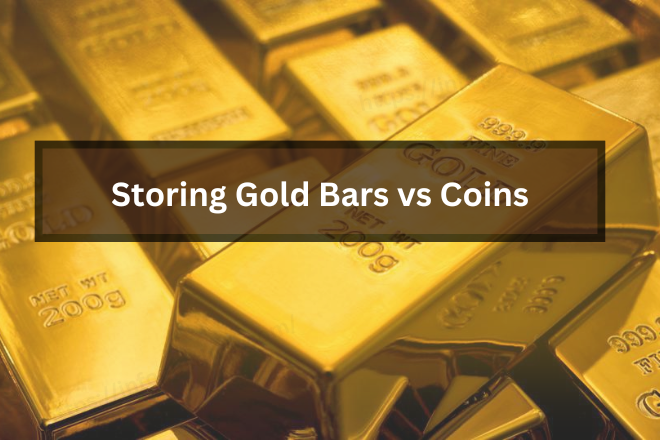Storing Gold Bars vs Coins

When it comes to investing in gold, one of the key decisions you’ll face is choosing between gold bars and coins for storage. Both options offer unique benefits, but the best choice often depends on your investment goals and personal preferences. Gold bars typically offer a higher gold content for the price, making them ideal for larger investments. On the other hand, gold coins can be easier to sell and often carry historical or collectible value.
In this article, we’ll explore the pros and cons of storing gold bars vs coins, helping you decide which option aligns best with your investment strategy.
Why Invest in Gold?
Before diving into the details of storing gold bars vs. coins, it’s important to understand why people invest in gold in the first place. Gold has been a symbol of wealth and stability for centuries, often seen as a hedge against inflation, currency devaluation, and economic instability.
Many investors turn to gold during times of uncertainty, as it tends to retain value when paper currencies or stock markets falter. In addition, gold can diversify a portfolio, reducing overall risk by balancing the volatility of other investments like stocks or bonds.
Now that you know why gold is a popular investment, let’s get into the specifics of storing gold bars vs. coins.
Storing Gold Bars
Gold bars are the traditional form of storing large amounts of gold. Also known as gold bullion, bars come in various sizes, from as small as 1 gram to as large as a 400-ounce brick, which is typically used by central banks and large institutions.
Pros of Storing Gold Bars
- Lower Premiums: One of the primary benefits of gold bars is that they tend to come with lower premiums compared to coins. This means that you’ll pay closer to the actual spot price of gold when purchasing bars. The larger the bar, the lower the premium percentage, which can make gold bars more cost-effective for those looking to make a substantial investment.
- Efficient Storage: Gold bars are compact, and storing them can be more space-efficient compared to coins. This is particularly true for large quantities of gold, as bars stack neatly and take up less room.
- Standardized Sizes: Since gold bars come in standardized sizes and weights, they’re easier to measure and value. If you’re buying gold as a pure investment, the uniformity of bars makes them a simple and straightforward option.
Cons of Storing Gold Bars
- Less Liquid: Gold bars can be harder to sell or trade than coins, particularly if you own large bars. Selling a 1-kilogram gold bar might not be practical if you only need to liquidate a small portion of your gold holdings.
- Higher Risk in Handling: Because gold bars are usually larger, each bar carries significant value. If you lose or damage a bar, the financial impact can be substantial. This makes bars less practical for those who may need to sell gold in smaller amounts.
- Counterfeit Concerns: Gold bars are more commonly counterfeited than coins, especially in larger sizes. It’s important to ensure that any gold bar you purchase is certified and comes from a reputable source.
Storing Gold Coins
Gold coins offer a more flexible option for those looking to invest in gold. Popular gold coins like the American Gold Eagle, Canadian Maple Leaf, and South African Krugerrand are recognized worldwide and come in various weights, typically from 1/10 ounce to 1 ounce.
Pros of Storing Gold Coins
- More Liquid: Coins are smaller, more divisible, and easier to sell in small increments compared to bars. If you only want to sell a portion of your gold holdings, it’s much easier to sell a few coins than to liquidate an entire bar.
- Collectible Value: Some gold coins have additional value due to their rarity or numismatic appeal. For instance, certain historical or limited-edition coins can be worth more than their gold content, providing an opportunity for additional profit.
- Global Recognition: Many gold coins are minted by governments and are recognized worldwide. This makes them easy to verify, buy, and sell across international markets.
- Easier to Authenticate: Gold coins often come with distinctive markings and designs that are harder to counterfeit. Additionally, their smaller size makes them easier to verify with standard tests like weighing or measuring.
Cons of Storing Gold Coins
- Higher Premiums: Gold coins typically come with higher premiums than bars. You’ll pay more above the spot price of gold for the manufacturing, design, and distribution costs associated with coins. This can eat into your overall investment value, especially if you buy smaller denominations.
- Less Efficient Storage: While gold coins are easier to sell in small amounts, they’re bulkier and take up more space compared to bars. If you have a large amount of gold, storing multiple coins can be less efficient than storing a few larger bars.
- Limited Value in Some Cases: While some coins carry numismatic value, many modern bullion coins are valued purely for their gold content. If you’re looking to invest solely in gold as a commodity, the extra premium on coins may not be worth it.
Security Considerations for Storing Gold
No matter whether you choose gold bars or coins, security is paramount. Gold is valuable, and if it’s not stored properly, it can become a target for theft. Here are a few key storage options for keeping your gold secure:
Home Storage
Some investors choose to store their gold at home in a safe. This offers easy access, but it also comes with risks. If you’re storing gold at home, investing in a high-quality safe that’s bolted down is essential. You’ll also want to make sure your home insurance covers high-value items like precious metals.
Bank Safety Deposit Boxes
A popular option for gold storage is a bank safety deposit box. This option provides secure storage outside of your home, but keep in mind that you may not have immediate access to your gold, especially if the bank is closed. Also, safety deposit boxes aren’t typically insured, so you’ll need to purchase additional insurance.
Professional Vault Storage
For those who prefer maximum security, professional vault storage facilities are an excellent option. These facilities specialize in storing precious metals and offer the highest level of protection. Many vaults are also fully insured, providing peace of mind. However, professional storage comes with an annual fee, which is something to factor into your overall investment costs.
FAQs
Which is better for investment: gold bars or coins?
It depends on your goals. Gold bars are better for larger investments due to lower premiums, while gold coins offer more liquidity and flexibility for smaller transactions.
Do gold coins hold more value than gold bars?
Gold coins can hold more value than bars if they are rare or have numismatic value. However, modern bullion coins are generally valued based on their gold content, similar to bars.
Is it safer to store gold at home or in a vault?
Storing gold in a professional vault is generally safer than keeping it at home. Vaults offer higher security and insurance coverage, while home storage requires additional precautions.
Are gold bars harder to sell than coins?
Gold bars, especially larger ones, can be harder to sell in small amounts compared to coins. Coins offer more flexibility if you need to liquidate part of your investment.
What are the storage fees for professional vaults?
Storage fees for professional vaults vary but typically range from 0.5% to 1% of the value of your gold annually, depending on the facility and the amount of gold stored.
Conclusion
When deciding between storing gold bars vs. coins, the best option depends on your investment goals and storage preferences. If you’re looking to invest in large amounts of gold with lower premiums, bars may be the better option. However, if liquidity, flexibility, or collectibility is important to you, coins might be a smarter choice.
Regardless of your choice, it’s crucial to consider security and storage options carefully. Whether you decide to store your gold at home, in a bank, or in a professional vault, taking steps to protect your investment will help ensure its long-term value.






